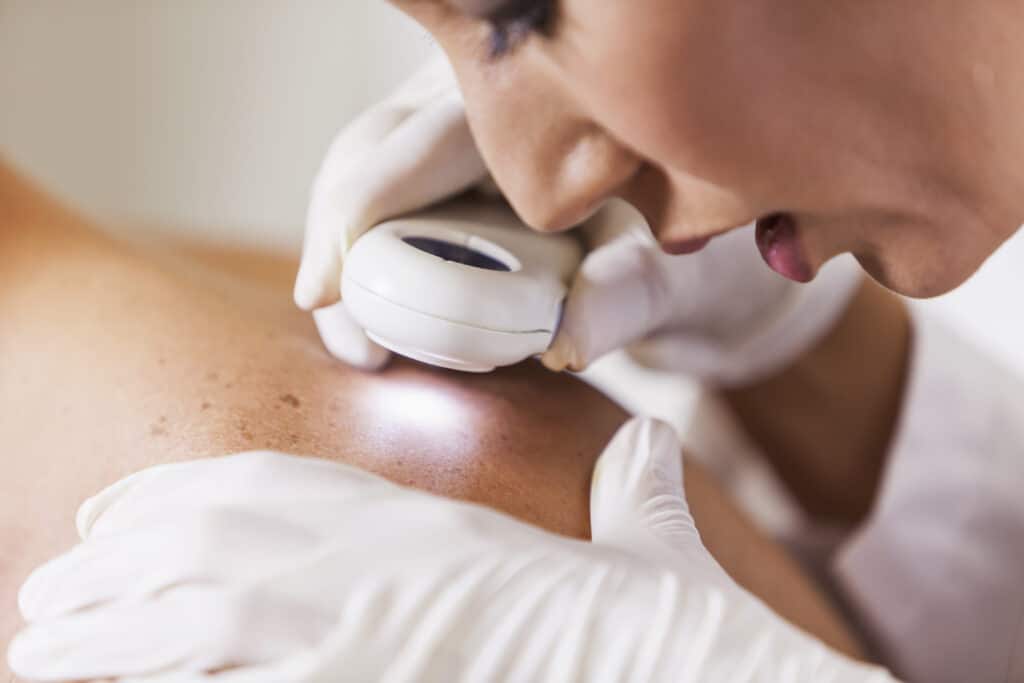According to the American Academy of Dermatology, 1 in 27 men and 1 in 40 women will be diagnosed with melanoma in their lifetime. This rapidly spreading form of skin cancer most commonly affects people over the age of 65; however, it is also the most common form of cancer in young adults between ages 25 and 29, and the second most common form of cancer among teens ages 15 to 19.
Why does melanoma affect so many more older adults than younger people? There are a few factors at play, and understanding them can help you lower your risks.
3 Things That Increase Skin Cancer Risks Among Older Adults
1: Higher Cumulative UV Damage
The UV rays that provide light and warmth across California are a form of solar radiation that can be damaging to the skin. UV sun damage accumulates over time – just 5 sunburns in a lifetime can double your risks of developing melanoma and nonmelanoma skin cancers.
Though this is where our minds tend to go when we think of UV damage, excessive sun exposure can still cause lasting damage even if you don’t experience a sunburn. That’s why it’s so important to be proactive in preventing sun damage by using sunscreen and limiting exposure as much as possible.
2: Lifestyle Factors That Increase Skin Cancer Risks
Older populations are less likely to use sunscreen consistently. The CDC estimates less than half of adults over 65 years old protect their skin from the sun when outdoors for extended periods. This is mostly attributed to a lack of awareness about UV damage and elevated skin cancer risks as we get older. Likewise, it can be difficult to incorporate a new habit into your daily routine. However, in this case, doing so can be life-saving.
As we understand more about the importance of protecting our skin against sun damage, a wider variety of skincare and beauty products now include SPF. These products are also better formulated to absorb into the skin without leaving a sticky residue or white cast, two of the most common reasons people skip applying sunscreen.
3: Aging and Health Changes
Our bodies undergo numerous changes as we age. This includes our skin getting thinner, which makes it more susceptible to UV damage, which can penetrate deeper layers of tissue. Our healing capabilities also begin to slow, and the immune system may be less effective, both of which contribute to increased risks of skin cancer after age 65.
While aging is a natural part of life that should be embraced, there are steps we can take to keep our bodies as healthy as possible.
- Get enough sleep to boost your body’s healing
- Stay hydrated and eat antioxidant-rich foods as part of a balanced diet
- Exercise regularly to support your immune system
- Try to cut back on smoking, which also increases your risk of skin cancer
- Make an annual skin exam part of your health routine
Dr. Brian P. Mekelburg is a leading dermatologist in Los Angeles who specializes in skin cancer diagnosis and treatment. With more than 30 years of expertise, he is skilled in recognizing the earliest signs of skin cancer, giving you the best chance for successful recovery. Dr. Mekelburg offers a variety of treatment options, including topical medications, curettage and electrodesiccation, and excisions.
If you’ve been diagnosed with skin cancer or notice a suspicious mole or lesion, schedule a consultation at the office of Dr. Mekelburg today. Our team will perform a thorough skin cancer screening and order any necessary additional testing. Should melanoma or another type of skin cancer be detected, we will walk you through your treatment options and help guide you through the entire recovery process. Call (310) 659-9075 now.



